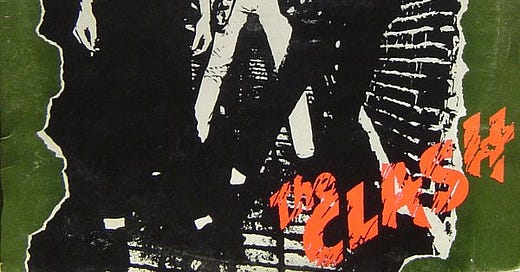As this newsletter has seen some growth, not exactly at Omicon rates but growth nonetheless, I am reasonable confident that some readers may have a copy of this album which finishes on a different track number to the one I am looking at1.
To understand the genesis of the song we need to look at two events. The first is a review in The NME in 1976 and the second was triggered by the band signing for CBS in early 1977.
On the first, Charles Shaar Murray wrote after a gig in 1976 that The Clash are
…the kind of garage band who should be returned to the garage immediately, preferably with the engine running, which would undoubtedly be more of a loss to their friends and families than to either rock or roll.
With this constructive criticism2 ringing in their ears, the band kick off the song with “Back in the garage with my bullshit detector / Carbon monoxide making sure it's effective” taking ownership of the concept of being a garage band.
The second was a probably what we would now call a shout out to the haters. The band signed a £100,000 contract with CBS Records - that was a huge cheque for a band with barely a couple dozen gigs under their belt and only a few of those as the headline act. When you have a punk background like The Clash did, that kind of money will have you explaining to the music press and your own fans why you’ve not sold out. So, this is a manifesto from the band to those haters - “We're a garage band!”
Joe Strummer has said;
I was trying to say that this is where we come from and we know it, and we're not going to get out of our depth. Even though we've signed with C.B.S. we aren’t going to float off into the atmosphere like the Pink Floyd or anything.
While the scene might get larger, they might get more famous and richer - they may become less punk even but they’ll always have that D.I.Y. spirit running through them like a stick of rock. Ironically, “Garageland” is a song that itself sounds more like Mott The Hoople (you can hear "All The Way From Memphis" in the riff) than The Ramones or The Sex Pistols - building on the pub rock sound of Stummer’s previous band the 101ers rather than their contemporary class of 1977.
Elsewhere, the narrator laments that his friends' bands are signing contracts and buying new boots with the cash advance as well as making record executives rich. Strummer would come back to this subject matter, including the boots, on the band’s second album, Give Em Enough Rope with “All the Young Punks (New Boots and Contracts)”. That same year Strummer and the band also covered the wearing of Burton suits on “(White Man In) Hammersmith Palais”
Mick Jones indicated that this song had to be the last song as it was one that indicated where they were moving next. Finally, someone on the record stating what we’ve long suspected at The Run Out Grooves! Where they were heading next would be a route to fame in the US and a 180 degree flip from Murray in the NME within two years, calling The Clash "the greatest rock band in the world”.
By the end of the decade the appointed “only band that matters” would be adding reggae, rockabilly, New Orleans jazz, ska to their repriotre on a double album that still had that thread of the London garage band in it.
The US version of The Clash’s debut has ‘Jail Guitar Doors’ followed by ‘Garageland’ as the fifteenth and final track. The UK’s is preceded by ‘48 Hours’ and is track 14.
Not enough to say they are rubbish - but also that they should also be dead!





Great focus on a specific moment, Mitchell! Hilarious to hear CS Murray's complete flip...At some point, CBS used (at least) "the only band that matters" in print ads and press releases, understandably. Working at a Houston record store at the time (and very into all things "punk"), it was fun seeing a staid, corporate monolith like CBS sign a UK punk band, with no real evidence of punk breaking through, yet, sales-wise, or even with airplay.
Plus, I distinctly remember talking with a couple of the local/regional CBS reps, asking them about their strategy to gain airplay and/or sales, and they had (predictably, I guess) nothing but shrugs and heavy sighs for me, as they didn't/couldn't understand the whole thing! I think the corporate "jitters" of breaking a decidedly British band to middle America dictated that they "play with" deleting tracks, re-arranging positions on the album, etc from what we called "imports" vs. the domestic releases! Amazing how literally frightened labels were of this stuff, but they had to keep up, and each felt the pressure to sign their own punk bands at the time!
Kudos to CBS (at least the suits at Black Rock in NYC), I guess, for being prescient enough to be able to see a talent that would eventually break through the narrow lane of constrictive "punk," and hats off to The Clash for stretching and realizing their potential, making use of all the added genres you wisely listed!
CBS' patience would finally be rewarded, as the band came up with eventual airplay breakthroughs...there was still a rather noticeable push-back on punk at radio, until more palatable and homogenized "new wave" bands like Police and Blondie finally made this "scary new punk thing" safe for housewives!
Saw The Clash on their "London Calling" tour, and was impressed by their ability to pull off live what they laid down on vinyl. Fun to go back to that time...thanks again, Mitchell!